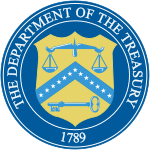Sources
| ||
| Deputy Secretary of the Treasury |  | |
| Under Secretary of the Treasury for International Affairs |
| |
| Under Secretary of the Treasury for Domestic Finance |
| |
| Under Secretary of the Treasury for Terrorism and Financial Intelligence | ||
| Treasurer of the United States | ||
| International | |
|---|---|
| National | |
| | This United States government–related article is a stub. You can help Wikipedia by expanding it. |